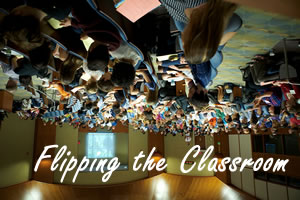Everybody in the academic community has heard of MOOCs – Massive Online Open Courses – by now. But how about MOOOPs – “massively obsolete ordinary operating procedures”?
For more than a hundred years, the standard operating procedure for the typical college course has included lectures, textbooks and exams to cover massive amounts of information – but left out the methods of thought that lead to creating the information.
The annual January Teaching Workshop to be held Jan. 11 and sponsored by the University of Virginia Teaching Resource Center, will offer practical and inspirational approaches to teaching students “disciplinary thinking” – how to think like a historian or a scientist, for example.
One approach, known as “flipping the classroom,” continues as the Teaching Resource Center’s yearlong theme.
“Flipping the classroom” encompasses methods that deliver course content outside of class in a variety of ways, then turn class time into face-to-face time – a workshop where students can explore course concepts, apply new knowledge, test their skills and interact through hands-on activities.
Other workshop approaches and topics include discussions about new, technologically enhanced “hybrid” courses; the use of social media in building community; students’ responsibilities for their learning and classroom behavior; and online education at U.Va.
The teaching workshop’s interactive sessions, free and open to faculty and graduate teaching assistants, will be held in Nau and Gibson halls. Participants may attend one session or the full day. Pre-registration is not required, but it is encouraged.
After a registration period from 8:30 to 9 a.m., the event begins with the plenary session’s guest speaker, Lendol Calder, a history professor at Augustana College in Rock Island, Ill.
Smaller concurrent sessions follow. The final one, from 1 to 2 p.m., will feature staff from the Arts and Sciences Center for Instructional Technology highlighting some instructional design elements to consider when flipping a course and demonstrating some hardware and software suggested for a successful flip. Click here for the complete schedule.
Calder, a recent winner of the CASE/Carnegie Illinois Professor of the Year award, has worked to advance the field of history teaching and learning. His talk, “Have I Flipped? Teaching Disciplinary Thinking Through Signature Pedagogies,” will explore innovative teaching practices that promote academic modes of thought and scholarship.
“Disciplinary thinking” refers to the habits of mind that scholars in the disciplines use to create inquiries, construct knowledge and provide warrants for what they claim to know – all that combines to form “a signature pedagogy,” Calder said.
When subjects get “covered,” academic disciplinary thinking gets “covered up,” as Calder has described it. His 1996 essay, “Uncoverage: Toward a Signature Pedagogy for the History Survey,” called on history teachers to demystify historical-mindedness by uncovering historians’ basic modes of thought in the classroom.
Disciplinary thinking is what teachers really want their students to know, especially in a world where information is a click away and always changing. But, he asks, how to teach cognitive habits effectively?
Calder will emphasize what is “beyond coverage” – using methods that lead to “uncovering” for students the distinctive modes of thought underlying individual disciplines.
A session from 10:30 a.m. to noon, “Reports from the Hybrid Frontier: Ups, Downs, Lessons Learned,” will focus on another new approach to teaching. Three U.Va. professors who took up U.Va. President Teresa A. Sullivan’s “Challenge for Newly Hybrid Technology-Enhanced Courses” will talk about their experiences designing and delivering the courses in a compressed time frame of a few weeks.
Biology professor Claire Cronmiller and Colleen Kelly, associate professor and director of the M.F.A. Acting Program in the drama department, both from the College of Arts & Sciences, and Law School professor J.H. “Rip” Verkerke are among 10 U.Va. professors who planned courses enriching traditional in-class activities with Web-based or digital technologies to deepen student engagement and learning.
“It’s a great tune-up for the new semester,” said Judith Reagan, the center’s senior associate director and teaching workshop coordinator.
Media Contact
Article Information
January 3, 2013
/content/teaching-workshop-discuss-flipping-classroom-hybrid-courses-and-social-media

